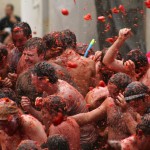Contributed by Jay Gamelin, pastor at Jacob’s Porch, a Lutheran campus mission to The Ohio State University, Columbus, OH
Warm-up Question
What is the one thing (thing means object, not person) you think you could not give away if someone who really needed it asked for it? Why?
Smells Like Frankincense
 The royal family of Oman wants the world to know that frankincense is the scent of Gold, both figuratively and literally. Twenty-five years ago the royal family of Oman commissioned a French perfumer to create a fragrance for the nation of Oman and “Gold”, the name of the fragrance created, is considered by many to be one of the greatest perfumes. For 25 years the company has sold this perfume for a non-recession-fearing price of $230 for a 50ml bottle, about 1.7oz. Currently it sells through many department stores in Europe, Russia, the U.S. and Asia. The royal family is now looking to move into the European markets by opening a store in London. As the family grows its presence, it hopes to grow its coffers as well.
The royal family of Oman wants the world to know that frankincense is the scent of Gold, both figuratively and literally. Twenty-five years ago the royal family of Oman commissioned a French perfumer to create a fragrance for the nation of Oman and “Gold”, the name of the fragrance created, is considered by many to be one of the greatest perfumes. For 25 years the company has sold this perfume for a non-recession-fearing price of $230 for a 50ml bottle, about 1.7oz. Currently it sells through many department stores in Europe, Russia, the U.S. and Asia. The royal family is now looking to move into the European markets by opening a store in London. As the family grows its presence, it hopes to grow its coffers as well.
Analysts at Goldman Sachs estimate that the global beauty industry (consisting of skin care products worth $24 billion; make-up, $18 billion; hair-care products, $38 billion; and $15 billion of perfumes) is growing at up to 7% a year, more than twice the rate of the developed world’s GDP. The sector’s market leader, L’Oreal, has had compound annual profits growth of 14% for 13 years. Sales of Beiersdorf’s Nivea have grown at 14% a year over the same period.
Discussion Questions
- What perfumes or colognes do you like or use? How much would you be willing to pay for this perfume?
- What is one beauty product you would be willing to give up for the rest of your life? What is one beauty product you would not give up?
Scripture Texts (NRSV) for Sunday, March 21, 2010 (Fifth Sunday of Lent)
(Text links are to Oremus Bible Browser. Oremus Bible Browser is not affiliated with or supported by the Evangelical Lutheran Church in America. You can find the calendar of readings for Year C at Lectionary Readings.)
For lectionary humor and insight, check the weekly comic Agnus Day.
Gospel Reflection
It’s a hard lesson this week. In the face of the way Americans consume the world’s resources (6% of the world’s population consuming 43% of the world’s resources) it seems you would want to be on the side of Judas Iscariot. Why waste this perfume when it could be sold and given to the poor? I know what he is saying—I even agree! How could we allow such waste, especially when it comes to something one could call frivolous and luxurious like perfume? No one on the planet needs perfume. It is only a luxury with no point other than to smell good.
But Jesus rebukes Judas. He says it is time for perfume. He remarks that it is not time to be without. It has a place, this waste. Jesus gives permission for excess. Jesus says it is OK to overdo it. What gives? How is there value in throwing money away?
We are surrounded by darkness. We see the problems of the world every day. The temptation is to pour our whole selves solely into saving the world in any way that we can. But Jesus points us to the idea that we must not always address the dark. Sometimes we are called to celebrate in the light. Sometimes we must sing, even if the poor are still poor. Sometimes we need to eat well, even feast, even if there are hungry people in the world. We are not called to a life without; instead, we are called to a life of moderation.
As the Buddhist tenet says, “everything in moderation including moderation.” We can fast but we must also learn to feast when it is the right time. We must learn when to go without and when to spend prodigally. As the poet Jack Gilbert argues in his remarkable and wonderful poem “A Brief for the Defense”, we must risk the ability to delight in the world. Indeed, Gilbert goes so far as to argue that only to pay attention to injustice is akin to praising the devil. We must learn to love beauty, to enjoy company, to celebrate when the time is right, and to love a beautiful and wonderful world, even in the face of injustice.
We must learn to live with what we have, but this means having room to celebrate, to feast, to enjoy as well. We must feast when the bridegroom is present. We must risk delight.
Quotables:
For a copy of Jack Gilbert’s “A Brief for the Defense”, pick up a copy of “Refusing Heaven” at your local bookseller. For a chance to read the poem, visit the Poetry center at Smith College website: http://www.smith.edu/poetrycenter/poets/abrief.html
Discussion Questions
- What is something you “feast” on, something that helps you celebrate life? (i.e. music, eating with friends, dates with your beloved, buying gifts) What would life feel like without this feasting? How would it feel to lose this forever?
- This “thing” that you feast on, what would it look like to live this in moderation? Could you put limits on what you spend? What time you give?
Activity Suggestion
The Essentials: Have every person in the group sit down with pencil and paper. They are going to take a trip, let’s say to Paris, for two weeks. Have each person take about 5 minutes to write down a packing list. Try to think of everything they would want to bring.
After they go, have everyone share their lists with one another. If someone says the same thing as on your list, cross it off your lists. If someone says 2 pairs of pants, cross two off but leave the 3rd. After everyone shares, see what items remain on people’s lists that have not been crossed off. Then discuss:
- These things left on your list, do you consider them essentials? Why or why not? What would happen if you left these behind?
- These things everyone crossed off, which of these things do you think you could do without in traveling? What would happen if you left them behind?
- How do you decide what is necessary in life? What guides your decisions? Is it how you feel? What you think?
Closing Prayer:
Jesus, we celebrate your presence. We feast with you every Sunday. We thank you that we may live a life of plenty. But also teach us God with what we should do with our plenty. Teach us moderation so that we may delight in your will and walk in your ways. In your holy name we pray, AMEN.

